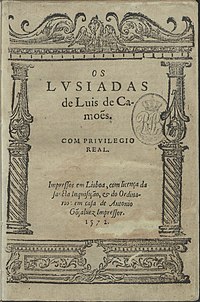The Lusiads

Front of the first edition of Os Lusíadas
|
|
| Author | Luís de Camões |
|---|---|
| Original title | Os Lusíadas |
| Translator | William Julius Mickle |
| Country | Portugal |
| Language | Portuguese |
| Genre | Epic poetry |
|
Publication date
|
1572 |
|
Published in English
|
1776 |
| Media type | |
Os Lusíadas (Portuguese pronunciation: [uʒ luˈzi.ɐðɐʃ]), usually translated as The Lusiads, is a Portuguese epic poem by Luís Vaz de Camões (sometimes anglicized as Camoëns).
Written in Homeric fashion, the poem focuses mainly on a fantastical interpretation of the Portuguese voyages of discovery during the 15th and 16th centuries. Os Lusíadas is often regarded as Portugal's national epic, much in the way as Virgil's Aeneid was for the Ancient Romans, or Homer's Iliad and Odyssey for the Ancient Greeks. It was first printed in 1572, three years after the author returned from the Indies.
The poem consists of ten cantos, with a variable number of stanzas (1102 in total), written in the decasyllabic ottava rima, which has the rhyme scheme ABABABCC, in a total of 8816 lines of verse.
The poem is made up of four sections:
The narration concludes with an epilogue, starting in stanza 145 of canto X. The most important part of Os Lusíadas, the arrival in India, was placed at the point in the poem that divides the work according to the golden section at the beginning of Canto VII.
The heroes of the epic are the Lusiads (Lusíadas), the sons of Lusus—in other words, the Portuguese. The initial strophes of Jupiter's speech in the Concílio dos Deuses Olímpicos (Council of the Olympian Gods), which open the narrative part, highlight the laudatory orientation of the author.
...
Wikipedia
